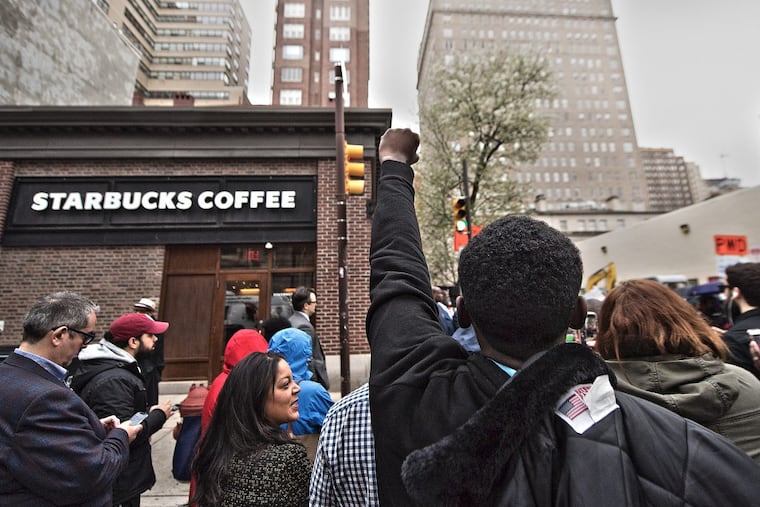Starbucks to close all U.S. stores on May 29 for racial-bias training after arrests in Philadelphia
All stores will close for the afternoon for racial-bias training. Former Attorney General Eric Holder is among those who will be working with the company on the training.

Starbucks will close all of its stores in the United States on the afternoon of May 29, to conduct training in "racial-bias education," prompted by the arrests of two black men at a Center City Starbucks last week in an incident that continues to draw national outrage.
Americus Reed, professor of marketing at the Wharton School of the University of Pennsylvania, called the move by the Seattle-based coffee chain to close its stores for training "remarkable."
"I haven't heard of anything like this before," Reed said.
In a news release Tuesday, Starbucks said it would close its more than 8,000 company-owned stores and its corporate offices for the afternoon to provide training to its nearly 175,000 employees. That training also will be required for all employees who join the company, according to the statement.
"Closing our stores for racial-bias training is just one step in a journey that requires dedication from every level of our company and partnerships in our local communities," Starbucks chief executive Kevin Johnson said in the statement.
The training aims to sensitize employees to bias and promote inclusion "to ensure everyone inside a Starbucks store feels safe and welcome," the release said.
Former U.S. Attorney General Eric Holder is among those helping to develop the curriculum for that training. Others include Bryan Stevenson, founder and executive director of the Equal Justice Initiative; Sherrilyn Ifill, president of the NAACP Legal Defense and Education Fund; Heather McGhee, president of the public policy group Demos; and Jonathan Greenblatt, chief executive officer of the Anti-Defamation League.
Reed, the Wharton professor, said the gold-standard case in brand crisis management comes from 1982 when Tylenol pulled its products from store shelves, a move that cost the company millions of dollars, after several people died from consuming cyanide-laced Tylenol pills.
He said Starbucks' decision to close its doors for an afternoon will also "cost a lot of money," but it's a move that signals that combating racial bias is very important to the company. Reed referenced Starbucks' failed 2015 "Race Together" campaign, which urged baristas to facilitate conversations about race with their customers.
"Starbucks has identified themselves as a values-driven company, and they've identified that this particular issue is important to them," he said. "In that sense, they want to be thought leaders in this space. Consumers may be skeptical whether that will move the needle but it's certainly signaling Starbucks cares about this."
>>READ MORE: Starbucks arrests in Philadelphia: CEO Kevin Johnson promises unconscious-bias training for managers
>>READ MORE: Inquirer photographer describes image behind viral Starbucks meme
On Tuesday, Stewart Cohen, a lawyer representing the men who were arrested, held a news conference at his office, releasing few details about Thursday's incident but disclosing that the coffee chain's chief executive had apologized to the men. The two have not been publicly identified.
"I'm not going to be taking any questions, and my clients are not going to agree to any interview at this time," he said.
Cohen then read a statement issued jointly with Starbucks:
"For the past several days, Starbucks CEO Kevin Johnson and the gentlemen involved in the incident at the Philadelphia Starbucks store have engaged in constructive discussions about this issue as well as what is happening in communities across the country.
"Mr. Johnson apologized on behalf of Starbucks, and the conversation continues today about how this painful incident can become a vehicle for positive social change. We have a situation — and the people at the center of it have come together with civility, common purpose and a willingness to listen and work towards a solution. Together we ask that the community respect this process. There will be more to follow. "
Reed said Johnson's decision to travel to Philadelphia and become involved in the crisis so early on was unusual.
"But it is the day and age we live in, because from a social media perspective everybody has a cellphone in their pocket and they can be a consumer vigilante," he said. "Consumers are demanding what you stand for and what your values are."
Meanwhile, the Philadelphia Commission on Human Relations is looking into reports of other incidents at the same Starbucks location, at 18th and Spruce Streets.
Mayor Kenney's office said the commission would "review the firm's policies, guidelines and procedures, including whether Starbucks has written policies, whether the policies are enforced uniformly, and how much discretion is left to individual employees."
The mayor's statement said the commission was looking into "additional reports that have come to their attention about this specific location." It provided no details about the reports or the nature of those incidents.
>>READ MORE: For black cafe patrons, Starbucks arrests raise concerns and interest in black businesses
That Starbucks has been the scene of daily protests since a video of the arrests went viral over the weekend. The store's manager called police while the men sat waiting for a third man without ordering. She said they refused to leave. After the men told police they were not leaving, they were handcuffed, removed from the cafe, and held for eight hours. No charges were filed.
Kenney and Police Commissioner Richard Ross have said the officers who made the arrest did nothing wrong, indicating the responsibility rests mainly with Starbucks.
Still, the city said the Police Department is "reviewing protocols related to how officers respond to such circumstances."